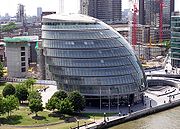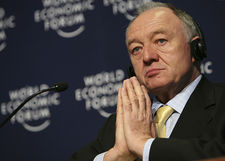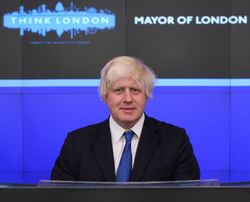Mayor of London
| Mayor of London |
|
|---|---|
| Style | No courtesy title or style |
| Appointer | Electorate of Greater London |
| Term length | Four years |
| Inaugural holder | Ken Livingstone 4 May 2000 |
| Formation | Greater London Authority Act 1999 |
| Succession | 4 May 2012 |
| Deputy | Deputy Mayor of London Richard Barnes |
| Salary | £143,911 |
| Website | london.gov.uk/mayor |
The Mayor of London is an elected politician who, along with the London Assembly of 25 members, is accountable for the strategic government of Greater London (see Greater London Authority). Since 4 May 2008, Conservative Boris Johnson holds the position. Previously, the position was held by Ken Livingstone from the creation of the role on 4 May 2000 until his succession by Johnson.
The role, created in 2000 after the London devolution referendum, was the first directly elected mayor in the United Kingdom. The Mayor of London is also referred to as the London Mayor, a form which helps to avoid confusion with the Lord Mayor of the City of London, the ancient and now mainly ceremonial role in the geographically smaller central region of the ancient City of London. The Mayor of London is the mayor of all Greater London (including the City).
Contents |
Elections
The Mayor of London is elected by Supplementary Vote for a fixed term of four years, with elections taking place in May. As with most elected posts in the UK, there is a deposit, in this case of £10,000, returnable on the candidate's winning at least 5% of the first-choice votes cast.
2000
The 2000 campaign was incident-filled. The eventual winner, Ken Livingstone, went back on an earlier pledge not to run as an independent after losing the Labour nomination to Frank Dobson. The Conservative Party had to replace Lord Archer of Weston-super-Mare as their candidate when he was charged with perjury; Steve Norris was elected as his replacement.
| London Mayoral Election Results 2000 | ||||||||
|---|---|---|---|---|---|---|---|---|
| Name | Party | 1st Preference Votes | % | 2nd Preference Votes¹ | % | Final | %² | |
| Ken Livingstone | Independent | 667,877 | 39.0 | 178,809 | 12.6 | 776,427 | 57.9 | |
| Steven Norris | Conservative | 464,434 | 27.1 | 188,041 | 13.2 | 564,137 | 42.1 | |
| Frank Dobson | Labour | 223,884 | 13.1 | 228,095 | 16.0 | |||
| Susan Kramer | Liberal Democrat | 203,452 | 11.9 | 404,815 | 28.5 | |||
| Ram Gidoomal | CPA | 42,060 | 2.4 | 56,489 | 4.0 | |||
| Darren Johnson | Green | 38,121 | 2.2 | 192,764 | 13.6 | |||
| Michael Newland | BNP | 33,569 | 2.0 | 45,337 | 3.2 | |||
| Damian Hockney | UKIP | 16,324 | 1.0 | 43,672 | 3.1 | |||
| Geoffrey Ben-Nathan | Pro-Motorist Small Shop | 9,956 | 0.6 | 23,021 | 1.6 | |||
| Ashwin Tanna | Independent | 9,015 | 0.5 | 41,766 | 2.9 | |||
| Geoffrey Clements | Natural Law | 5,470 | 0.3 | 18,185 | 1.3 | |||
| London |
This article is part of the series: |
|
|
|
Governance
Boroughs
Elections
Functional bodies
Transport
Policing
In the UK
In the EU
Other
|
|
Other countries · Atlas |
2004
In 2004, the second election was held. After being re-admitted to the Labour Party, Ken Livingstone was their official candidate. He won re-election after second preference votes were counted, with Steve Norris again coming second.
| London Mayoral Election Results 2004 | ||||||||
|---|---|---|---|---|---|---|---|---|
| Name | Party | 1st Preference Votes | % | 2nd Preference Votes | % | Final | % | |
| Ken Livingstone | Labour | 685,541 | 35.7 | 250,517 | 13.0 | 828,380 | 55.4 | |
| Steven Norris | Conservative | 542,423 | 28.2 | 222,559 | 11.6 | 667,178 | 44.6 | |
| Simon Hughes | Liberal Democrat | 284,645 | 14.8 | 465,704 | 24.3 | |||
| Frank Maloney | UKIP | 115,665 | 6.0 | 193,157 | 10.0 | |||
| Lindsey German | RESPECT | 61,731 | 3.2 | 63,294 | 3.3 | |||
| Julian Leppert | BNP | 58,405 | 3.0 | 70,736 | 3.7 | |||
| Darren Johnson | Green | 57,331 | 2.9 | 208,686 | 10.9 | |||
| Ram Gidoomal | CPA | 41,696 | 2.2 | 56,721 | 2.9 | |||
| Lorna Reid | IWCA | 9,542 | 0.5 | 39,678 | 2.1 | |||
| Tammy Nagalingam | Independent | 6,692 | 0.4 | 20,391 | 1.1 | |||
2008
The incumbent Labour Mayor, Ken Livingstone was defeated by Conservative candidate Boris Johnson becoming London's 2nd Mayor.
| London Mayoral Election Results 2008 | ||||||||
|---|---|---|---|---|---|---|---|---|
| Name | Party | 1st Preference Votes | % | 2nd Preference Votes1 | % | Final2 | %3 | |
| Boris Johnson | Conservative | 1,043,761 | 42.48 (+14.3%) | 257,792 | 10.49 | 1,168,738 | 53.2 | |
| Ken Livingstone | Labour | 893,877 | 36.38 (+0.7%) | 303,198 | 12.34 | 1,028,966 | 46.8 | |
| Brian Paddick | Liberal Democrat | 236,685 | 9.63 (–5.2%) | 641,412 | 26.11 | |||
| Siân Berry | Green | 77,374 | 3.15 (+0.3%) | 331,727 | 13.50 | |||
| Richard Barnbrook | British National Party | 69,710 | 2.84 (–0.2%) | 128,609 | 5.23 | |||
| Alan Craig | Christian Peoples Alliance | 39,249 | 1.6 (–0.6%) | 80,140 | 3.26 | |||
| Gerard Batten | UKIP | 22,422 | 0.91 (–5.1%) | 113,651 | 4.63 | |||
| Lindsey German | Left List | 16,796 | 0.68 | 35,057 | 1.43 | |||
| Matt O'Connor4 (withdrawn) | English Democrats | 10,695 | 0.44 | 73,538 | 2.99 | |||
| Winston McKenzie | Independent | 5,389 | 0.22 | 38,954 | 1.59 | |||
1Second preference votes are only used to elect the mayor if no single candidate receives more than 50% of the vote. Only the top two candidates receive the second preference votes.
2On papers where the 1st and 2nd choice votes are for the top two candidates, the 2nd choice votes are not counted.[1]
3Percentage figures are not officially published on the final votes, they are produced here for illustration and are calculated by dividing the candidate's final vote by the total of final votes. When based on the total votes cast, however, the figures are 48.4% and 42.6%.
4Matt O'Connor withdrew from the election in the week prior to polling day but his name remained on the ballot paper.[2]
2012 Election
Candidate selection process
Conservative Party
Boris Johnson, the incumbent, may stand again for the Conservative Party. It has been speculated, however, that Johnson may choose not to run for re-election and may instead stand for Parliament in the next general election with a view to succeeding David Cameron as the Leader of the Conservative Party.[3] Cameron has himself said that he is "sure" Johnson will be the Conservative candidate for mayor in 2012.[3]
Labour Party
Prospective Labour candidates had until 18 June 2010 to announce their decision to stand for the party's nomination. The names will be shortlisted by a panel of national and London party representatives on 24 June before a series of hustings across the capital. An electoral college, made up half of votes by London party members and half by members of affiliated organisations, will then pick the candidate. The result will be announced on 24 September 2010.
Former Mayor Ken Livingstone and former Labour MP Oona King have both announced that they are running for the Labour Party's nomination[4] as have Seton During and Emmanuel Okoro. Mr During is a chartered engineer and a former councillor in Enfield, while Mr Okoro is an artist.[5]
MP David Lammy, former Labour cabinet minister Alan Johnson,[6][7] MP Jon Cruddas and businessman Alan Sugar were also rumoured as potential candidates[8] but did not stand. Lammy endorsed Livingstone's candidacy [9][10]
Liberal Democrats
Caroline Pidgeon, the leader of the Liberal Democrat London Assembly Group, is a possible candidate for her party's nomination. Brian Paddick, who was the party's 2008 nominee, may also run again. Lembit Öpik, the well-known former MP who lost his Montgomeryshire seat in a surprise defeat in the 2010 general election,[11] is also considered to be a likely possible candidate.[12]
List of Mayors

| Name | Portrait | Entered office | Left office | Political party | |
|---|---|---|---|---|---|
| Ken Livingstone |  |
4 May 2000 | 4 May 2008 | Independent 2000–2004 | |
| Labour 2004–2008 | |||||
| Boris Johnson |  |
4 May 2008 | Incumbent | Conservative | |
Initiatives
Initiatives taken by Ken Livingstone as Mayor of London included the London congestion charge on private vehicles using city centre London on weekdays, the creation of the London Climate Change Agency, the London Energy Partnership and the founding of the international Large Cities Climate Leadership Group, now known as C40 Cities Climate Leadership Group. The Congestion charge led to many new buses being introduced across London.
They have also included the London Partnerships Register which was a voluntary scheme without legal force for same-sex couples to register their partnership, and paved the way for the introduction by the United Kingdom Parliament of civil partnerships. Unlike civil partnerships, the London Partnerships Register was open to heterosexual couples who favour a public commitment other than marriage.
As Mayor of London, Ken Livingstone was also a supporter of the London Olympics in 2012, and is known to encourage sport in London; especially when sport can be combined with helping UK charities-like The London Marathon and British 10K charity races. However, Livingstone, in a Mayoral election debate on the BBC's Question Time (TV series) programme in April 2008 did state that the primary reason he supported the Olympic bid was to secure funding for the redevelopment of the East End of London. In the summer of 2007 he brought the Tour de France cycle race to London.
In May 2008, Boris Johnson introduced a new transport safety initiative to put 440 high-visibility police officers on bus hubs and the immediate vicinity.[13] A ban on alcohol on underground, bus, Docklands Light Railway, and tram services and stations across the capital was announced.[14]
Also in May 2008, Boris Johnson announced the closure of The Londoner newspaper, saving approximately £2.9 million. A percentage of this saving will be spent on planting 10,000 new street trees.[15]
Salary
The Mayor of London's current salary is £143,911 per year, which is similar to that of a government Cabinet minister's.[16]
See also
- Deputy Mayor of London
- Foreign relations of the Mayor of London
- Lord Mayor of the City of London
References
- ↑ Results: Mayor London Elects
- ↑ O'Connor pulls out of mayor race BBC
- ↑ 3.0 3.1 Hélène Mulholland (14 April 2010). "I expect Boris Johnson to stand for second term as London mayor, says David Cameron". The Guardian. http://www.guardian.co.uk/politics/2010/apr/14/david-cameron-boris-johnson-conservatives.
- ↑ "Ken Livingstone launches bid for new term as London mayor", The Guardian, 1 June 2010
- ↑ "Labou London mayor candidates announced", BBC News, June 18, 2010
- ↑ "Will Jon Cruddas enter the race for London mayor?", New Statesman, 27 May 2010
- ↑ "Will it be Boris Johnson v Alan Johnson in 2012?", New Statesman, 18 May 2010
- ↑ "Cruddas for London mayor?", New Statesman, 19 January 2010
- ↑ "London's best hope is Livingstone.", Guardian, 1 June 2010
- ↑ http://www.thisislondon.co.uk/standard/article-23654514-sir-alan-sugar-is-asked-to-run-for-mayor.do
- ↑ Chris Smyth (7 May 2010). "Lembit Opik loses seat to Conservatives". The Times. http://www.timesonline.co.uk/tol/news/politics/article7119009.ece.
- ↑ Tom Meltzer (3 June 2010). "Lembit Opik, standup comedian". The Guardian. http://www.guardian.co.uk/politics/2010/jun/03/lembit-opik-standup-comedian.
- ↑ GLA Press Release - New action on transport safety
- ↑ GLA Press Release - Plan to ban alcohol on the transport network
- ↑ GLA Press Release - Closure of The Londoner newspaper
- ↑ Greater London Authority - Annual Budget
External links
|
|||||
|
||||||||||||||
|
|||||||||||
